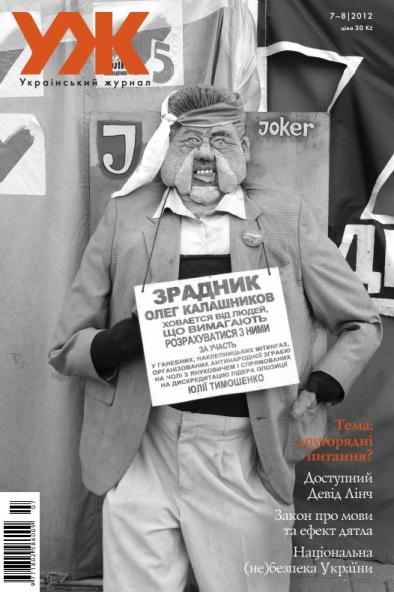The Ukrainian Journal
May 11, 2013 -
Example Author
-
Books and Reviews

Ukrainski Zurnal.jpg
A Ukrainian magazine published in Prague, but addressed to readers in multiple countries – the Czech Republic, Poland and Slovakia? But who would read this? Where did the idea for such a specific customer profile come from? The interest in Ukraine is not only prejudged by geographical proximity, but by the strong presence of Ukrainian communities in these countries – both indigenous, minority and migrant. Additionally, the uniqueness of the magazine is decided by the ambition needed to create such a publication, whose perspective goes beyond the boundaries of the given country and local specificities; an attempt to look at Ukraine and being Ukrainian in the wider context of Central Europe.
At the source of the creation of the magazine in 2005 was the encouragement of the exchange of ideas and the integration of Ukrainian speaking intellectual circles in Central Europe. For example by the publication of articles and interviews with the participation of authors from all countries, including the Czech Republic, Poland, Slovakia and of course Ukraine.
Each issue of the magazine focuses on a leading topic, but since its beginnings there has been a noticeable shift in theme from cultural and socio-historical topics, towards politics. While in the previous numbers you could find topics such as leading architecture and urbanism, religion, historical Ukrainian cinematography and Bukovina, the last few numbers concentrate on current political issues. And so, in the most recent copies you can find a discussion about the last parliamentary elections in Ukraine, as well as an attempt to assess the Yanukovych presidency over its three years, and an analysis of the opportunities for Ukraine get closer to the European Union.
How does this balance of recent years look like according to the authors? On the pages of the Ukrainian Journal you will find key points about the contemporary political debate in Ukraine. Much space is devoted to tearing the country between the East and the West, between Russian and European influences. On the one hand we have the ambiguous policy of Yanukovych, whose manoeuvring between Russia and the European Union at least properly illustrates the last summit in Brussels. Jurij Romanenko, as well as Taras Berezowec’ point out that Yanukovych is really a skilful politician, despite being portrayed in a completely different way in widespread media coverage.
Another subject for discussion is the issue of Russian influence. In the article Russia has forgotten Ukraine Iwan Preobrażeński points out that the last Ukrainian election did not receive much attention in the Russian media. Nor were there any open attempts to influence the outcome of the elections. Among various reasons (such as Yanukovych’s disappointment as well as understanding the organisational influence of Russian media on Ukrainian receivers), Preobrażeński also underlines that Russia finally started seeing Ukraine as being abroad; the same trend being noticed in the relationship with Moldova. Ołeksandr Piddubny has a completely different opinion. He believes that from the Kremlin’s perspective, Ukraine is still a “domestic territory” where Russia is fighting for influence through economic instruments, disinformation and discreditation. In strong words, like an economic or informational war, in his text Piddubny calculates the impact of the measures applied by Russia, as well as the significant role of the neighbour in irritating the Polish-Ukrainian conflict of memory. But focusing on such broad Russian influence, the author does not however want to notice the neglect of the Ukrainian state – not only in relation to the current leadership team.
Comments about the developments in Ukraine have always been an important element of the Ukrainian Journal (mainly because of the readers in the Czech Republic and Slovakia, where the subject matter of the Ukrainian media is portrayed in a much more stingy way than in Poland). It is unfortunate that the most recent numbers are lacking in topics that are not political and “cross-cutting” in theme, which distinguished the magazine, not only with a taste of timelessness but also by allowing the reader to see Central Europe through the Ukrainian perspective.
Natalia Kertyczak
The Ukrainian Journal is a cultural-political magazine addressed to Ukrainian-speaking intellectual circles in Central and Eastern Europe, particularly Poland, the Czech republic, Slovakia and Ukraine. Published in 2005, it points out important issues from the regional, social, political, historical and cultural perspectives. The magazines archives (since 2007) are available at: http://www.ukrzurnal.eu/. The monthly publication is now accessible every two months.
The review was written within the Free Speech Partnership programme supported by the Visegrad Fund.

































